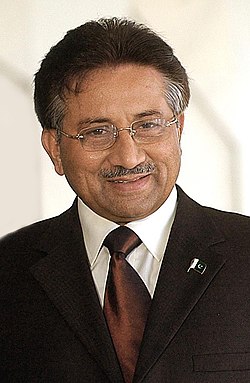This article relies largely or entirely on a single source .(June 2024) |
January 1, 2004 | |||||||||||||||||||||||
702 votes in the Electoral College 352 electoral votes needed to win | |||||||||||||||||||||||
|---|---|---|---|---|---|---|---|---|---|---|---|---|---|---|---|---|---|---|---|---|---|---|---|
| |||||||||||||||||||||||
 A map of the results, by each chamber | |||||||||||||||||||||||
| |||||||||||||||||||||||
| ||
|---|---|---|
Politics  | ||
A confidence vote was held by the Electoral College of Pakistan on 1 January 2004, in which Pervez Musharraf won 374 out of 702 votes. As a result, according to Article 41(8) of the Constitution of Pakistan, he was "deemed to be elected" to the office of President until October, 2007. [1] [2]


